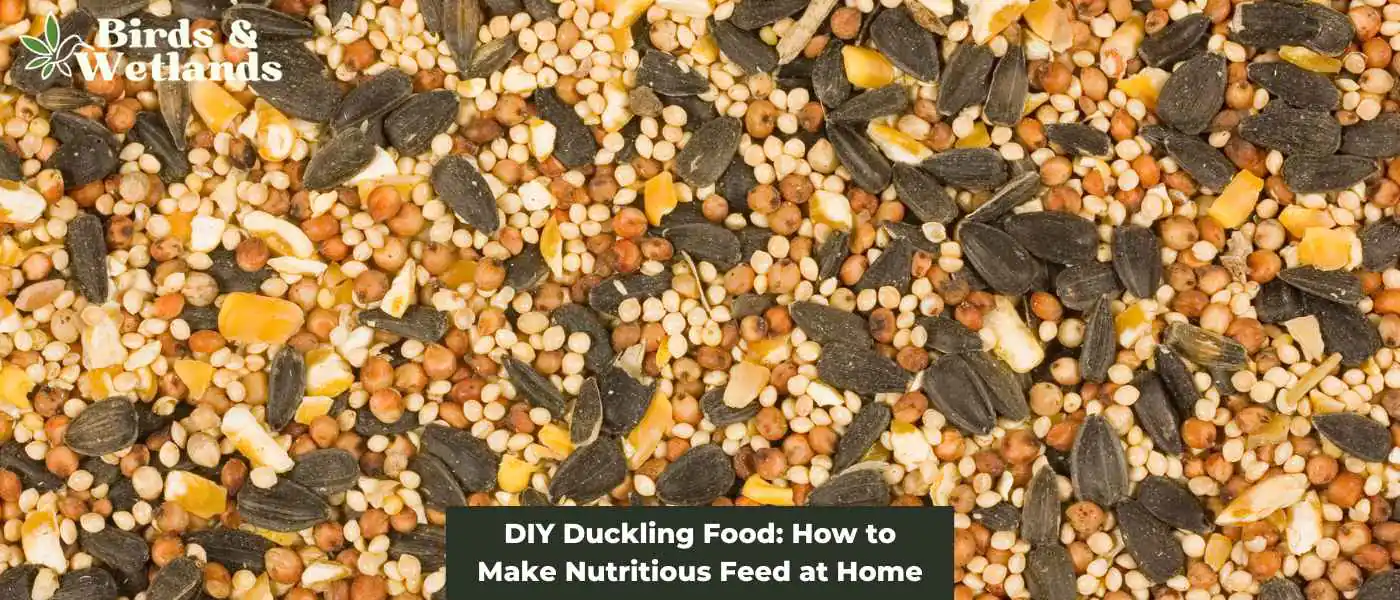Ducklings require a balanced and nutritious diet to grow into healthy adult ducks. While commercial duck feed is widely available, some duck owners prefer to make their own food at home.
Creating DIY duckling food can be a fun and cost-effective alternative to commercial feed. A basic homemade duckling feed recipe consists of grains, proteins, and some supplements. Combine rolled oats, wheat bran, cornmeal, and soybean meal as the base. Add dried insects or mealworms for extra protein. Include crushed eggshells or oyster shells for calcium, and add a small amount of brewer’s yeast to ensure adequate niacin levels.
Key takeaways:
While feeding wildlife, including ducks, can impact heavily on native fauna and their habitats, it can also have benefits for young children wanting to connect with nature.
Feeding ducks bread is not a good idea as it does not provide all their nutritional needs and can cause abnormalities and shorter lifespans.
Alternatives to bread that ducks may enjoy include chopped grapes, chopped apple, lettuce, peas, and grated carrot.
It is important to never overfeed ducks and to give the meal in small portions.
Recipe should contain all the carbohydrates, vitamins, minerals, calcium, and protein, all the things a growing native duck needs.
There are several options for making homemade duckling food. Some basic ingredients include grains, vegetables, and supplements like grit and oyster shell.
Duck owners can also consider adding protein-rich sources such as chicken feed or bugs to their DIY duckling food. However, it is important to research and understand the nutritional needs of ducklings before creating a homemade diet.
Why DIY Duckling Food?
Feeding ducks can be a fun and rewarding experience, but it can also be expensive. Commercial duck feed is often pricey and can be difficult to find in some areas. That’s why many people choose to make their own duck food at home. Here are some reasons why DIY duckling food might be a good option for you:
Cost-Effective
Making your own duck food can be a cost-effective alternative to buying commercial feed. You can use ingredients that are readily available and often cheaper than commercial feed. You can adjust the recipe to fit your budget and the number of ducks you have.

Control Over Ingredients
When you make your own duck food, you have complete control over the ingredients. You can choose high-quality, natural ingredients that are healthy for your ducks. This way, you can ensure that your ducks are getting a balanced and varied diet that meets their nutritional needs.
Better Nutrition
Commercial feed often contains fillers and additives that are not healthy for ducks. By making your own duck food, you can ensure that your ducks are getting the nutrients they need without any added chemicals or preservatives. You can also include protein sources that ducks love, such as hardboiled eggs, soybean meal, and sunflower seeds.
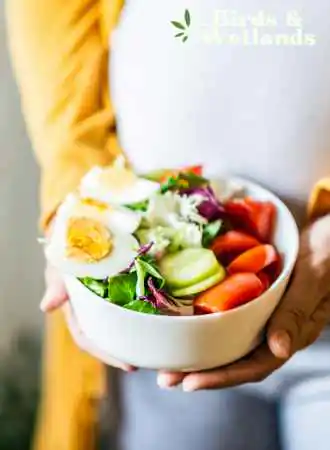
Variety
Ducks love a varied diet, and making your own duck food allows you to provide them with a variety of foods. You can include natural sources of protein, such as aquatic plants and wild rice, as well as healthy vegetable trimmings. You can also add supplements like oyster shell and rolled oats to ensure that your ducks are getting all the nutrients they need.
Fun and Educational
Making your own duck food can be a fun and educational activity for the whole family. It allows you to learn more about your ducks’ nutritional needs and experiment with different recipes. Feeding your ducks homemade food can create a stronger bond between you and your feathered friends.
Natural Diet for Ducks
Ducks are omnivorous birds that eat a variety of foods in the wild, including aquatic plants, insects, small fish, and even eggs. In this section, we will explore what wild ducks eat, why it is important to mimic a natural diet when feeding ducks, what to include in homemade duck feed, and what to avoid.
What Do Wild Ducks Eat?
Wild ducks have a diverse diet that varies depending on their habitat and the season. In general, they feed on a combination of plant and animal matter. Some common foods for wild ducks include:
Aquatic plants: Wild ducks consume a variety of aquatic plants, such as water hyacinth, wild rice plants, and other moist soil plants.
Insects: Ducks eat a variety of insects, including beetles, flies, and mosquitoes.
Small fish: Some species of ducks, such as mergansers, eat small fish.
Uncooked rice: Wild ducks eat uncooked rice in rice fields.
Eggs: Some ducks, such as mallards, consume the eggs of other birds.
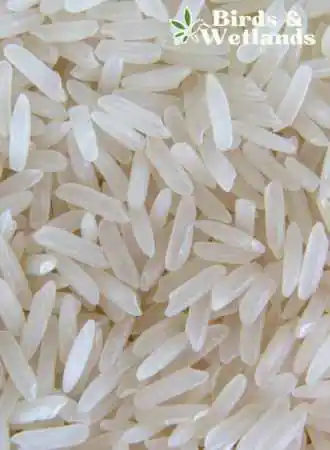
Why Mimic a Natural Diet?
Mimicking a natural diet is important for ducks because it provides them with all the nutrients they need to thrive. A natural diet also helps keep ducks healthy and prevents them from developing health problems that can arise from a poor diet.
Feeding ducks a natural diet can also help them develop strong bones and feathers, which is important for their overall health.
What to Include in Homemade Duck Feed
When making homemade duck feed, it is important to include a variety of foods that mimic a natural diet. Here are some ingredients that can be included in homemade duck feed:
Corn: Corn is a good source of carbohydrates for ducks.
Small fish: Adding small fish to homemade duck feed can provide ducks with protein and other essential nutrients.
Water hyacinths: Water hyacinths are a good source of vitamins and minerals for ducks.
Vegetables: Ducks can benefit from eating a variety of vegetables, such as peas, carrots, and spinach.
Grit: Grit helps ducks digest their food.
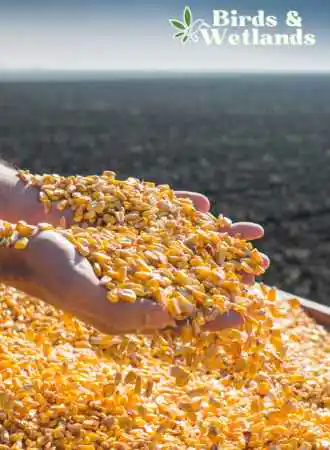
Manna Pro Poultry Grit
Maximize Your Ducks’ Health with Manna Pro Poultry GritThe Ultimate Digestion Aid
Discover the key to healthy, happy ducks with Manna Pro Poultry Grit – a product designed to enhance digestion and support your ducks’ overall well-being.

Pros
- Improved digestion: Manna Pro Poultry Grit helps ducks break down their food, promoting efficient nutrient absorption.
- Versatility: Not just for ducks, this poultry grit also serves as a useful amendment for potting soil in cactus and succulent gardens.
- Quick shipping: Customers appreciate the prompt delivery of Manna Pro Poultry Grit, ensuring their ducks get the grit they need as soon as possible.
- Larger grit pieces: The slightly larger grit pieces are still effective in aiding digestion and may provide a more efficient grinding action in the gizzard.
- Trusted by duck owners: Manna Pro Poultry Grit has received numerous positive reviews, making it a reliable and popular choice among duck owners.
Cons
- Not widely available in local stores
What to Avoid in Homemade Duck Feed
There are some foods that should be avoided when making homemade duck feed. These include:
Bread: Bread is not a natural food for ducks and can cause health problems if consumed in large quantities.
Chocolate: Chocolate is toxic to ducks and can be fatal if consumed.
Avocado: Avocado contains a toxin that can be harmful to ducks.
Onions: Onions can cause anemia in ducks.
Salty, sugary, or high-fat foods: These foods can cause health problems for ducks if consumed in large quantities.
Feeding Ducklings
When it comes to feeding ducklings, it is essential to provide them with a balanced and varied diet to ensure they grow healthy and strong. In this section, we will cover what to feed ducklings, how much to feed them, how often to feed them, and when to stop feeding them starter feed.
What to Feed Ducklings
Waterfowl feed, such as Purina Flock Raiser, is the best diet for a duckling. Unfortunately, feed specially made for waterfowl is difficult to find in many areas, so you may have to go with chick feed. There are two main types of feed made for chicks or ducklings: starter and grower.
Starter feed contains a higher percentage of protein, which is essential for a duckling’s growth. However, too much protein can cause health problems, such as angel wing, a condition where the wings grow too fast and become deformed. Therefore, it is crucial to ensure that the protein content of the feed is not too high.
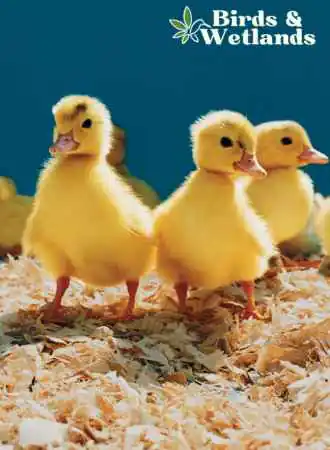
Ducklings can also feed on a variety of seagrasses, grains, vegetation, and invertebrates in the wild. These diets combined provide the much-needed nutrients for ducklings to grow.
How Much to Feed Ducklings
The amount of food a duckling needs depends on its age and size. As a general rule, a duckling should eat about 1/4 to 1/3 cup of feed per day. However, it is crucial to monitor their weight and adjust the amount of food accordingly.
How Often to Feed Ducklings
Ducklings should be fed several times a day, usually four to six times, to ensure they receive the necessary nutrients. However, it is essential not to overfeed them, as this can lead to health problems.
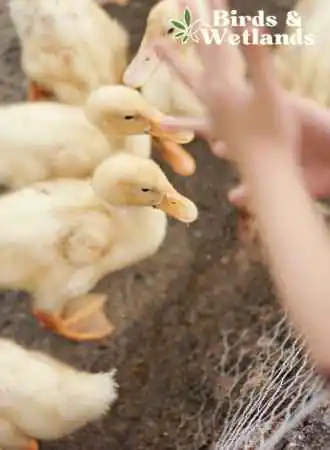
When to Stop Feeding Ducklings Starter Feed
Ducklings should be fed starter feed for the first three to four weeks of their life. After that, they can be switched to grower feed, which contains less protein. It is crucial to monitor their growth and adjust their diet accordingly to ensure they receive a balanced and varied diet.
DIY Duckling Food Recipes
Ducklings need nutritious food to grow and thrive. While there are commercial feeds available, making your own DIY duckling food can be a fun and rewarding experience. Here are three simple and healthy recipes that you can try at home.
Recipe 1: Wild Rice and Bird Seed Mix
Wild rice plants and bird seed are excellent sources of nutrition for ducklings. This recipe is easy to make and can be stored for later use.
Ingredients:
1 cup of wild rice plants
1 cup of bird seed
1 tablespoon of brewer’s yeast
Instructions:
Cook the wild rice plants according to package instructions.
Mix the cooked wild rice plants, bird seed, and brewer’s yeast in a bowl.
Serve the mix to the ducklings.
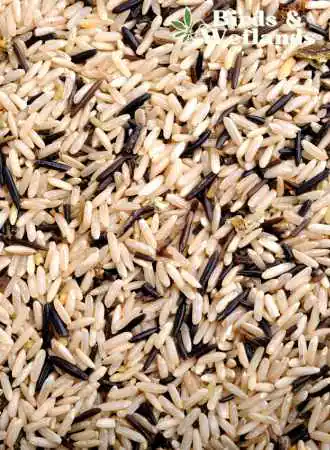
Recipe 2: Frozen Peas and Leftover Rice
Frozen peas and leftover rice are a great combination for a quick and easy DIY duckling food recipe. This recipe is ideal for those who have limited time and don’t want to feed ducks bread.
Ingredients:
1 cup of frozen peas
1 cup of leftover rice
1 tablespoon of brewer’s yeast
Instructions:
Cook the frozen peas according to package instructions.
Mix the cooked peas, leftover rice, and brewer’s yeast in a bowl.
Serve the mix to the ducklings.
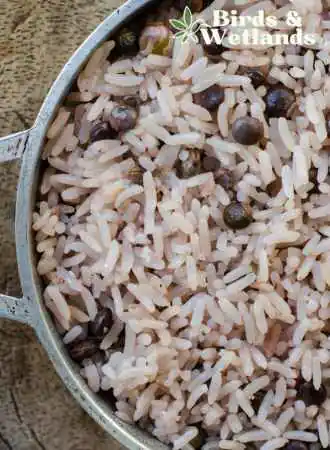
Recipe 3: Healthy Wild Duck Food Recipe
Ingredients:
1 cup brown rice
Greens (broccoli, carrot, and apple)
2 hard-boiled eggs (with shells)
2 tablespoons wholemeal flour
Method:
Preheat the oven to 180 degrees.
Cook the rice according to the instructions on the packet.
Finely chop the greens.
Grate the carrot and apple.
Crush the hard-boiled eggs and their shells.
Mix all the ingredients together in a bowl.
Roll the mixture into small marble-sized balls and place them on an oven-proof tray.
Bake in the oven for 10-13 minutes until soft and crumbly.
Baby ducks are wild animals and are natural foragers and enjoy exploring the natural world around them. These DIY duckling food recipes are a great way to do duck feeding with the nutrition they need while also allowing them to eat and grow in a natural environment.
If you plan to raise ducks, it’s vital you have a small duck pond for your duck flock and have a natural food supply for them. Feeding the ducks cracked corn, check food, and fish meal can be done in combination with commercial feed or your own DIY food. Also, consider your planting and ensure you have an excellent companion plant for them to forage in and have a balanced diet.
Best Overall Duck Feeder -FeatherEase Automatic Chicken Waterer & Feeder
Simplify Your Poultry Care with One Smart Solution!
Enhance your poultry care with the FeatherEase Automatic Chicken Waterer & Feeder, a convenient and efficient solution designed to keep your ducks and chickens well-fed and hydrated.

Pros
- Simplify your poultry care routine: Dual-function design combines an automatic waterer and feeder in one convenient unit.
- Save time and effort: Large feeder and waterer capacities reduce the need for frequent refill.
- Save money: Innovative no-waste feeding system minimizes feed spillage and waste.
- Long lasting: Food-grade, BPA-free materials ensure the safety and health of your poultry, while the durable constructio.
- Easy-to-assemble and maintain design simplifies the process of keeping your poultry hydrated and well-fed.
Cons
- Users with hard water may experience difficulty in separating the inner cup from the main cup of the waterer due to mineral buildup.
- The feeder’s holes may be too large for some users, allowing chickens to scatter food out, which could result in waste.
- The waterer may not function effectively in colder climates, requiring alternative solutions during the winter months.
FAQs on Homemade Duck Food
What is the best homemade food for ducklings?
The best homemade food for ducklings should be nutritionally balanced and include a mix of proteins, grains, and greens. Ingredients, like crushed or cooked peas, chopped hard-boiled eggs, and finely chopped greens, can provide essential nutrients. However, it’s important to note that commercial duck feed is specifically formulated to meet their needs, and homemade alternatives may not be as complete.
How do you make homemade duckling food?
To make homemade duckling food, combine a mix of proteins, grains, and greens, ensuring they are finely chopped or ground for easy consumption. Include ingredients such as crushed or cooked peas, finely chopped greens, and hard-boiled eggs. However, keep in mind that commercial duck feed is the best option, as it’s specifically designed to meet their nutritional requirements.
What do you feed a baby duck without starter feed?
If you don’t have access to starter feed, you can temporarily feed baby ducks a mix of crushed or cooked peas, finely chopped greens, and chopped hard-boiled eggs. Make sure the ingredients are finely ground to prevent choking. This solution should be temporary, as commercial duck feed is best for providing a balanced diet.
What do you put in homemade duck feed?
Homemade duck feed can include a variety of ingredients such as whole grains (like oats, barley, or wheat), leafy greens, vegetables, brewers yeast and proteins like cooked peas or cooked lentils. Remember that while homemade feed can be a temporary solution, it’s always best to use commercial duck feed, which is specifically formulated for their nutritional needs.

